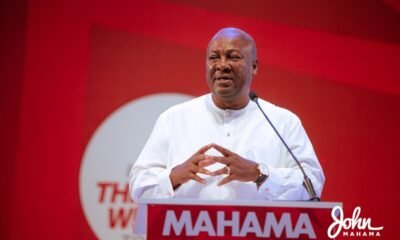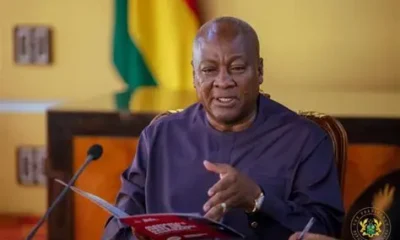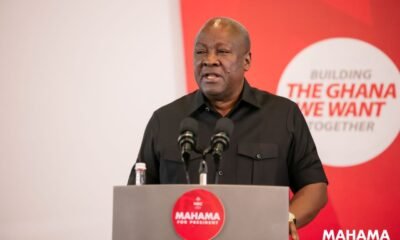NEWS
Mahama Invites Japanese Businesses to Partner in Ghana’s $10bn Big Push Agenda
Published
6 months agoon
By
Adubianews
President John Mahama has appealed to Japanese investors to take advantage of Ghana’s economic transformation drive under his proposed $10 billion “Big Push” programme, positioning the country as a gateway to Africa’s expanding markets.
Speaking at the Ghana Presidential Investment Forum, held on the sidelines of the 9th Tokyo International Conference on African Development (TICAD IX), Mahama described Ghana as “a stable, democratic, business-friendly gateway to West Africa and the continent.”
He stressed that Ghana’s growing consumer base, coupled with improving economic fundamentals and ongoing reforms, created the right environment for international partnerships. “We have a growing consumer market with improving macroeconomic fundamentals, clear reforms to lower the cost of doing business, and abundant opportunities for technology transfer,” he said.
Mahama explained that Ghana’s strategic location, alongside its role as host of the African Continental Free Trade Area (AfCFTA) Secretariat, made it an attractive hub for investors seeking to access both regional and continental markets. “Strategic geographical location. Ghana is a country through which the meridian and the UK intersect. The two intersect in Ghana’s territory just a few kilometres from our shore, and it’s also the host country for the African continental free trade area,” he told participants.
The President pointed to recent macroeconomic gains, noting that inflation had fallen from nearly 23 percent in 2024 to 13.7 percent, with projections of single-digit figures by year’s end. He also highlighted the stability of the cedi, describing it as “the best-performing currency in the world this year.”
In a bid to ease entry for smaller investors, Mahama announced reforms to the Ghana Investment Promotion Centre Act, eliminating minimum capital requirements. “In the reviewed Ghana Investment Promotion Centre Act, we are removing those minimal capital investments. This will enable any investor, however little money you have — $100,000, $50,000 — to be able to come in and set up a business in Ghana,” he explained.
He identified priority sectors where Japanese expertise and Ghana’s resources could align, particularly in automobile assembly, agribusiness, and energy. “Japan has a comparative advantage when it comes to automobile manufacturing. Using the opportunity to export not only into our sub-region but into Africa, Ghana becomes a good place for local assembly of automotive products,” he said.
On agriculture, he underlined Ghana’s vast potential with arable land, year-round sunshine, and the Volta Lake. “We have millions of hectares of land that border that huge lake, and the water can be used to bring about 2 million hectares of land under irrigation. But also, we intend to establish industrial parks so that we can process agri products. We can invest in textile manufacture for export into the EU markets, into the American market and other places,” he added.
Energy, Mahama said, also presents strong investment prospects, with Ghana leveraging hydropower and gas-to-power plants. “Our thermal plants are being run on gas. We’re bringing new gas fields into operation. And because we are members of the West African Power Pool, energy transmission systems are interconnected with our neighbouring countries. And so any excess of power we’re able to produce we can evacuate and sell to our neighbouring countries because we have a comparative advantage when it comes to power,” he noted.
Outlining the impact of the $10 billion “Big Push,” Mahama said the programme would enhance infrastructure, drive agro-processing, and strengthen industrial growth. “Our vision is anchored in our 10 billion big push. And the $10 billion big push is a program to improve the infrastructure of our country, especially in the road sector, in the industrial sector, agro-processing space and all that. So we’re investing $2 billion a year in infrastructure development,” he explained.
Calling for stronger ties with Japan, Mahama urged investors to embrace joint ventures, public-private partnerships, and collaborations with local firms. “We wish to encourage Japanese businessmen to look towards Ghana. Africa is the next frontier for investment. Most parts of the world are saturated when it comes to investment. Africa is opening up, growing, and is a place that Japan should be looking at. And so let us marry Japanese precision with Ghanaian potential and create a win-win situation for ourselves,” he said.
Concluding his address, Mahama reaffirmed his vision for a Ghana–Japan partnership rooted in innovation, industrialisation, and regional integration. “Ghana is open for business 24 hours a day, and at this decisive moment in our history, we’re working towards the economic transformation of Ghana. Our nation is embracing a bold vision, one that harnesses innovation, industrialisation and regional integration to unlock the full potential of our people and our resources,” he stated.
You may like
-


Mahama Warns Ghana’s Security Remains Fragile Amid Rising West African Instability
-


Mahama Calls for Urgent Economic Reforms to Drive Africa’s Development
-


Mahama to Lead First Accra Reset Davos Convening at World Economic Forum
-


Mahama’s Failure Not Needed for Bawumia’s Presidency – Campaign Spokesperson
-


President Mahama Travels to UK and Davos for Global Economic Engagements
-


Mahama Says Tough Reforms Have Set Ghana on a Sustainable Path
-


Mahama Marks One Year in Office with National Thanksgiving Service
-


Mahama Warns Ministers: First-Class Travel Ban Still Enforced
-


Commonwealth Hall Made Me Who I Am Today – President Mahama Tells UG Students

























